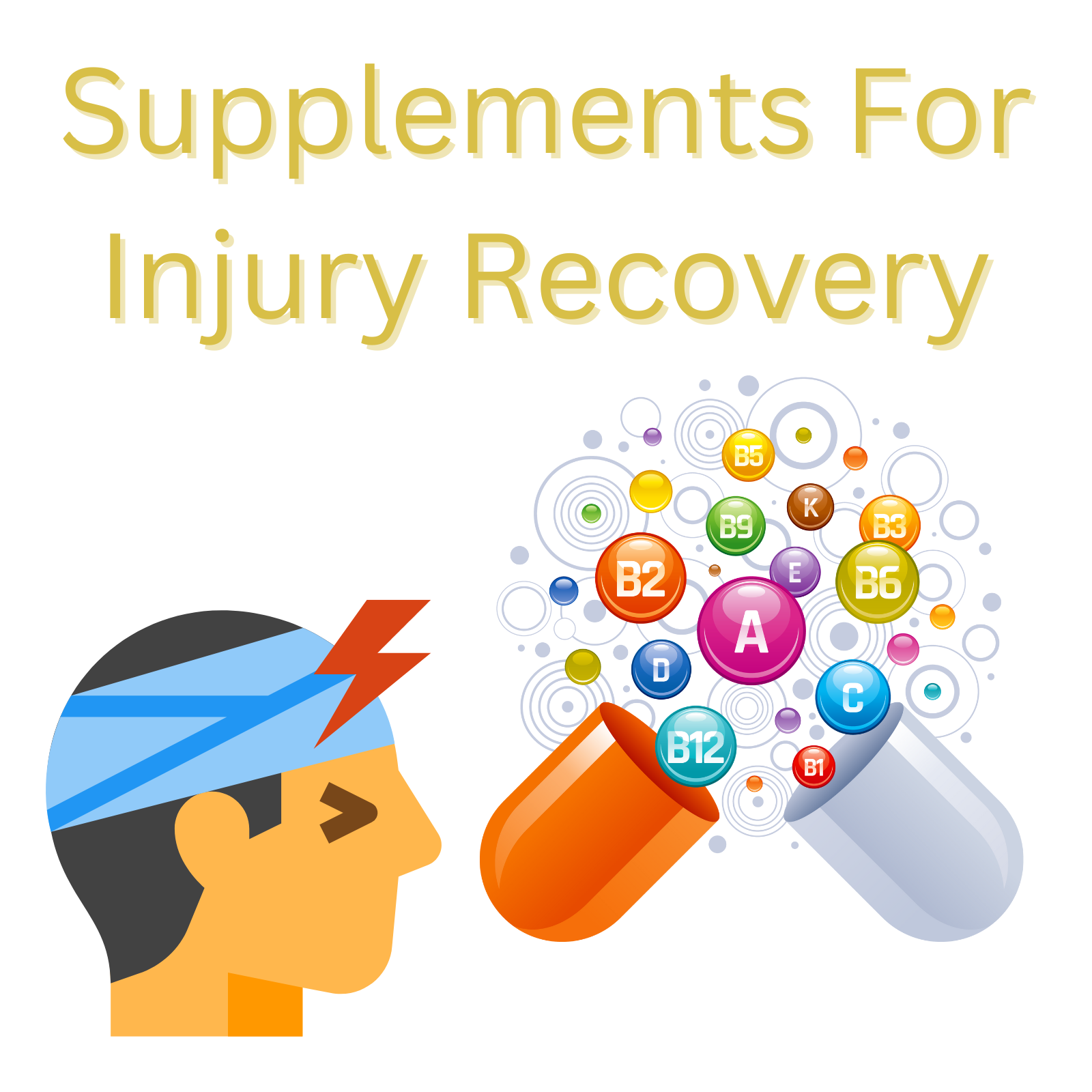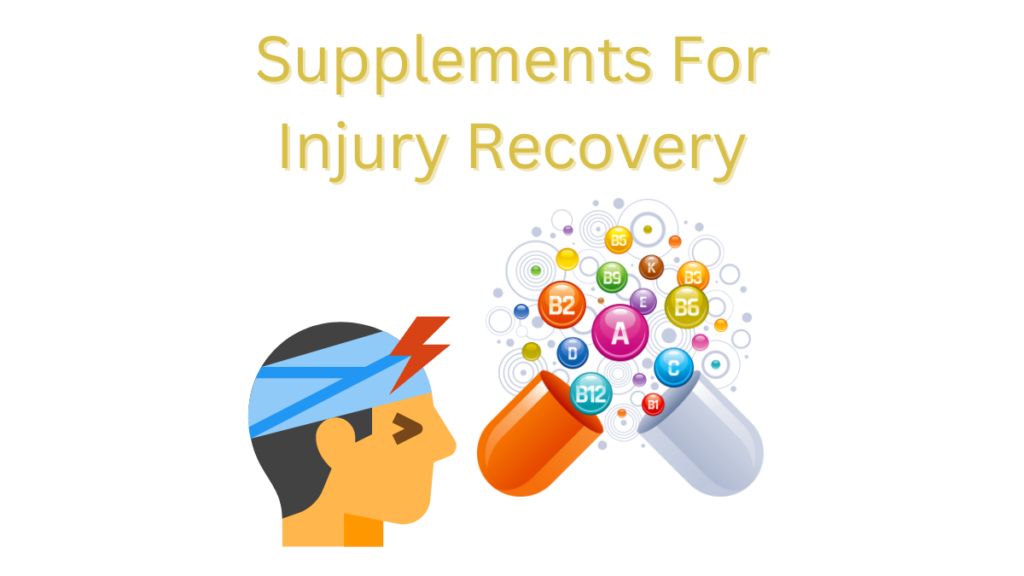
Best Supplements For Injury Recovery
Introduction

Best Supplements For Injury Recovery
Today we will go over the Best Supplements For Injury Recovery. Over the year the chances of someone getting some injury are extremely high approaching close to 90%. Granted this injury may not be serious but an injury is still an injury.
In this article I will cover how to recover from an injury and what supplements to take you expedite the recovery phase. It’s often under estimated how much good things proper supplementation can give you when you are recovering. From my experience as an athlete and doing body building supplementation has always been a vital part of my life.
I have experienced first hand how quickly you recover if you eat, rest and supplement properly in your day to day basis. Do note I’m not a healthcare professional but I promise all the information I’ll give you here is backed with studies and scientific articles which I’m going to reference below. On top of this I’ll add my personal experience with it but this does not mean that what worked for me will also work for you. We are all unique individuals and we react differently to supplementation. Having said that I believe my points will cover a wide spectrum and the majority of people.
The Importance of Supplements for Injury Recovery
There are many different types of supplements that can be taken to help with injury recovery. The most important thing to remember is that each person is different and what works for one, may not work for another. It is important to speak with a doctor or nutritionist to find out what the best course of action is for you.
Supplements can help to speed up the healing process by providing the body with the nutrients it needs to repair tissue. They can also help to reduce inflammation and pain.
Some of the most common supplements used for injury recovery include:
- Protein: Protein is essential for rebuilding damaged tissue. It can be found in foods such as meat, poultry, fish, eggs, and dairy products. You can also take protein supplements in the form of powders or bars.
- Amino acids: Amino acids are the building blocks of protein. They can help to repair damaged tissue and reduce inflammation. Amino acids can be found in foods such as meat, poultry, fish, eggs, and dairy products. You can also take amino acid supplements in the form of powders or capsules.
- Omega-3 fatty acids: Omega-3 fatty acids are anti-inflammatory and can help to reduce pain. They can be found in fish, such as salmon, mackerel, and sardines. You can also take omega-3 supplements in the form of capsules or liquids.
- Glucosamine and chondroitin: Glucosamine and chondroitin are two types of sugar molecules that are found in the cartilage around our joints. They can help to reduce inflammation and pain. Glucosamine and chondroitin can be found in supplements, such as powders, tablets, and capsules.
- Turmeric: Turmeric is a spice that contains curcumin, which is a compound with anti-inflammatory properties. It can help to reduce pain and swelling. Turmeric can be found in powder, capsule, or tablet form.
While supplements can be helpful, it is important to remember that they should not be used as a replacement for a healthy diet and lifestyle. Eating a balanced diet, exercising regularly, and getting enough sleep are all important for injury recovery.
The Best Supplements for Injury Recovery
Now that we talked about what works I’ll also go into supplementation you can just buy from the store to immediately start seeing results. There are many different supplements that can help with injury recovery. Some of the most popular and effective supplements include:
- Creatine – Creatine is a popular supplement that has been shown to help with muscle recovery and growth. It can be taken before or after workouts, or throughout the day.
- Fish oil – Fish oil is a great source of omega-3 fatty acids, which are beneficial for reducing inflammation and promoting healing. Fish oil can be taken in capsule form or as a liquid.
- Glutamine – Glutamine is an amino acid that has been shown to help with muscle recovery and immune function. It can be taken before or after workouts, or throughout the day.
- Vitamin C – Vitamin C is a powerful antioxidant that can help reduce inflammation and promote healing. Vitamin C can be taken in supplement form or through foods such as oranges, strawberries, and broccoli.
- Zinc – Zinc is a mineral that is essential for wound healing. It can be taken in supplement form or through foods such as oysters, beef, and pumpkin seeds.
- Ginger – Ginger is a spice that contains gingerol, a compound with powerful anti-inflammatory and pain-relieving properties. Ginger can be taken in supplement form or added to food.
- Bromelain – Bromelain is a compound found in pineapples that has powerful anti-inflammatory and pain-relieving properties. Bromelain can be taken in supplement form or added to smoothies or juices.
- Arnica – Arnica is a plant that has been used for centuries to treat bruises, swelling, and pain. Arnica can be taken in supplement form or applied topically as a cream or ointment.
How Supplements Can Help Recover From An Injury
Now that we covered the supplements to take, we will go over how those supplements work and help you recover from an injury. It’s important to note here that not all supplements work the same way and speed. With some you may see results in a short timespan while others could take weeks or even months until you see improvement. So keep that in mind when starting supplementation and make sure you research the duration of the efficiency of a supplement before you stop taking it due to the lack of fast results.
Furthermore most supplements work in different pathways of your injury while others numb the pain and help you cope, others work as catalysts to repair tissue, ligaments and bones to the extent that’s possible. A proper supplementation routine in my opinion requires the synergetic action of all those aspects combined. That’s why when you go to a doctor you get drugs that deal with different parts, some are pain killers while others
There are a variety of supplements that can help the body recover from an injury. One of the most important supplements for recovery is protein. Protein helps to repair and rebuild damaged tissue. It is also important to consume enough calories to support the body’s healing process. Other supplements that can aid in recovery include omega-3 fatty acids, vitamin C, zinc, and copper. Omega-3 fatty acids help to reduce inflammation, while vitamin C is essential for collagen production. Zinc and copper are important for wound healing.
Different Types of Supplement Available To Aid Injury Recovery
As we discussed earlier each supplement works in different ways to aid your injury so lets see specifically how some can help you on deciding how to make your own regime out of them.
There are a variety of supplements available to aid in the recovery from an injury. Some of the most common and effective supplements include:
- Protein: Protein is essential for repairing and rebuilding damaged tissue. It can be taken in powder form or through foods such as chicken, fish, and eggs.
- Amino acids: Amino acids are the building blocks of protein and are necessary for proper muscle function. They can be taken in supplement form or through foods such as meat, poultry, and beans.
- Creatine: Creatine is a compound that helps to supply energy to muscles. It can be taken in supplement form or through foods such as red meat and fish.
- Glutamine: Glutamine is an amino acid that helps to repair and rebuild damaged tissue. It can be taken in supplement form or through foods such as poultry, fish, and beans.
- Omega-3 fatty acids: Omega-3 fatty acids are a type of fat that is essential for proper cell function. They can be taken in supplement form or through foods such as fish, nuts, and seeds.
- Vitamins and minerals: Vitamins and minerals are essential for proper cell function and metabolism. They can be taken in supplement form or through foods such as fruits and vegetables.
What To Look For In A Good Supplement For Injury Recovery
There are a few key things to look for when choosing a supplement for injury recovery.
- First, you want to make sure that the supplement contains ingredients that have been proven to be effective in aiding in the healing process.
- Second, you want to choose a supplement that is easy to take and that does not have any unpleasant side effects.
- Finally, you want to select a supplement that is affordable and that will not break your budget.
How to Implement a Supplement Routine For Optimal injury Recovery
There are many different ways to approach implementing a supplement routine for optimal injury recovery. The most important thing is to work with a healthcare professional to create a plan that is tailored to your specific needs. Here are some general tips to get you started:
- Take a comprehensive approach: In order to recover optimally from an injury, it is important to take a comprehensive approach. This means addressing not just the physical injury, but also the psychological and emotional aspects of healing.
- Work with a healthcare professional: As mentioned above, it is important to work with a healthcare professional when creating a supplement routine for optimal injury recovery. They will be able to assess your individual needs and create a plan that is right for you.
- Incorporate a variety of supplements: There are many different supplements that can be beneficial for injury recovery. Some examples include omega-3 fatty acids, vitamin D, turmeric, and ginger. Work with your healthcare professional to determine which supplements are right for you.
- Be consistent: It is important to be consistent with your supplement routine in order to see the best results. This means taking the supplements as prescribed and not skipping doses.
- Be patient: Recovery from an injury can take time. It is important to be patient and trust the process. Remember that every person heals differently and there is no “right” timeline for recovery.
If you follow these tips, you will be on your way to implementing a supplement routine that can help you recover optimally from an injury.
Conclusion
If you enjoyed Best Supplements For Injury Recovery and would like to drop me a cheer below I would appreciate it.
What supplement regimen you follow when you get injured?
I have also a list of recommended articles similar to this one which you can find below:
Also I have assembled a list of resources I used to help me put the research together here for your reference:
You may also like

What Percent of Adults Can Bench 315

How Long Can the Average Person Sprint For

Does Lifting Weights Make your Hands Stronger
Archives
- February 2026
- January 2026
- December 2025
- November 2025
- October 2025
- September 2025
- August 2025
- July 2025
- June 2025
- May 2025
- April 2025
- March 2025
- February 2025
- January 2024
- October 2023
- September 2023
- August 2023
- July 2023
- June 2023
- May 2023
- April 2023
- March 2023
- February 2023
- January 2023
- December 2022
- November 2022
- October 2022
- September 2022
- August 2022
- June 2022
- May 2022
- April 2022
- March 2022
- January 2022
- December 2021
- November 2021
- October 2021
- August 2021
- November 2020
- July 2020
- May 2020
- April 2020
- March 2020
- August 2018
- July 2018
- June 2018
- April 2018
- March 2018
Categories
- Aftercare Procedures
- Age Groups
- AI/ML
- Alternative Medicine
- Ambient Computing
- Animal Health
- Animal Husbandry
- Animals
- Anti-Aging
- Architectural Design
- Art And Technology
- Auditory Science
- Augmented Reality
- Automation
- Babies
- Baby
- Beauty & Skincare
- Beauty Industry
- Biohacking
- Biomechanics
- Book Reviews
- Breastfeeding
- Budgeting
- Budgeting Strategies
- Business
- Cardiovascular Health
- Career Advice
- Career Development
- Career Growth
- Cats
- Chess
- Chronobeauty
- Circular Economy
- Civic Technology
- Cleaning Tips
- Cloud Computing
- Cognitive Health
- Cognitive Performance
- Cognitive Science
- Community
- Community Building
- Community Engagement
- Community Living
- Computer Vision
- Consumer Guides
- Consumer Trends
- Container Gardening
- Content Analysis
- Content Non-Technical
- Content Strategy
- Cooking Techniques
- Cosmetic Chemistry
- Cultural Events
- Cycling
- Data Analysis
- Data Engineering
- Data Governance
- Data Science
- Database
- Design Psychology
- Design Trends
- Developer Productivity
- Diet
- Diet
- Diet And Nutrition
- Digital Identity
- Digital Media
- Digital Wellbeing
- DIY
- DIY Projects
- Dogs
- Engineering Culture
- Entertainment News
- Environmental Impact
- Environmental Science
- Equity Compensation
- Ethical AI
- Exercise
- Exercise Science
- Exercise Technique
- Exotic Pets
- Fall Gardening
- Family
- Family Health
- Family Life
- Fashion Business
- Fashion Industry
- Fashion News
- Fashion Tech
- Financial Analysis
- Financial Optimization
- Financial Planning
- Flooring Maintenance
- Food
- Food Psychology
- Food Safety
- Food Science
- Food Tech
- Functional Fitness
- Functional Training
- Future Of Work
- Garden Care
- Garden Maintenance
- Gardening Tips
- Geospatial Data
- Gig Economy
- Greece
- Greek
- Greek Food
- Green Technology
- Gymnastics
- Hardware Engineering
- Health
- Health And Wellness
- Health Informatics
- Health Science
- Health Tech
- Health Technology
- Healthcare
- Healthcare Management
- Healthy Eating
- Healthy Recipes
- Holistic Health
- Holistic Wellness
- Home & Living
- Home Decor
- Home Financing
- Home Health
- Home Improvement
- Home Maintenance
- Home Organization
- Home Styling
- Horticulture
- Household Chemistry
- Identity Management
- Indoor Gardening
- Industrial Design
- Industry Analysis
- Infant Nutrition
- Infrastructure Management
- Ingredient Deep Dive
- Integrative Health
- Integrative Medicine
- Interior Design
- Internet of Things
- Internet of Things (IoT)
- Invalid Request
- Investment Strategies
- Investment Strategy
- IoT
- Kids
- Leadership Development
- Learning Strategies
- Lifestyle
- Lifestyle Brands
- Lifestyle News
- Lifestyle Optimization
- Literary Criticism
- Literature
- Logistics Management
- Machine Learning
- Material Science
- Materials Science
- Meal Planning
- Media Analysis
- Meditation
- Mental Health
- Mental Performance
- Mental Wellness
- Miami
- Miami Food
- Mind And Body
- Minimalism
- Mobile Development
- Neuroscience
- No Applicable Categories
- Nursing
- Nutrition
- Nutrition News
- Open Source
- Operating Systems
- Operational Resilience
- Opinion
- Organization Tips
- Outdoor Living
- Over 40
- Over 50
- Over 60
- Parenting
- Parenting
- Parenting Strategies
- Performance
- Performance Optimization
- Personal Development
- Personal Finance
- Personal Growth
- Personal Productivity
- Pet Care
- Pet Safety
- Philosophy
- Plant Care
- Politics
- Product Formulation
- Productivity
- Productivity Engineering
- Protein
- Psychology
- Psychology of Space
- Quantified Self
- Reading Culture
- Real Estate Investment
- Recipes
- Regulatory Compliance
- Remote Work
- Renovation Planning
- Resource Management
- Respiratory Health
- Responsible Pet Ownership
- Retail Strategy
- Retail Technology
- Robotics
- Science
- Seafood
- Seasonal Gardening
- Security
- Sedentary Health
- Self-Care
- Skincare Science
- Skincare Trends
- Sleep
- Sleep Health
- Smart Home
- Smoothies
- Social Impact
- Soft Skills
- Soil Health
- Spatial Computing
- Spatial Design
- Stress Management
- Supplements
- Sustainability
- Sustainability Science
- Sustainable Engineering
- Sustainable Fashion
- Systems Engineering
- Tax Optimization
- Tax Strategy
- Tech Investment
- Technical Writing
- Testing
- Travel
- Travel News
- Travel Safety
- Travel Tips
- Trend Analysis
- Tropical Plants
- Uncategorized
- Urban Gardening
- Urban Planning
- User Experience
- Veggie
- Vietnam
- Virtual Events
- Volunteering
- Wealth Management
- Wearable Technology
- Wellness
- Wellness Technology
- Winter Gardening
- Work-Life Balance
- Workplace Culture
- Workspace Setup
- World
- Writing
- Writing Skills
- Year In Review
- Yoga
- Yoga News
- Zero Waste
